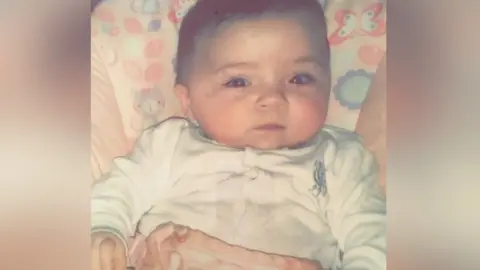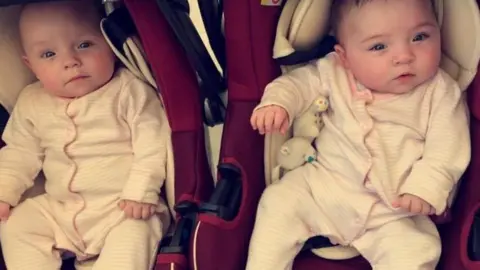Diesel fumes did not cause baby's death - inquest
 Family photo
Family photoA nine-month-old baby girl whose parents believe died after she was exposed to pollution at a neonatal unit died from sudden infant death syndrome (Sids), an inquest has found.
Annie-Jo Mountcastle, and her twin sister Florence-Rose, were born 12 weeks early at Glan Clwyd Hospital, in Denbighshire, on 5 February, 2017.
The twins' parents said they were harmed by diesel fumes and particles from building work outside that came in through an open window in their hospital room, eventually leading to Annie-Jo's death.
Betsi Cadwaladr Health Board said it accepts the coroner’s conclusion in full, and that it will look at his comments “in detail”.
John Gittins, coroner for north Wales (east and central), said he recognised the evidence from the girls’ father that the containments were present and it was probable that she had chronic lung disease, common in premature babies, which it would have placed pressure on.
But he said that “once removed, her condition returned to the baseline level that was result of her prematurity, rather than any pollutant”.
He said that after her discharge in April 2017, and her death in the November, she had not shown any signs of respiratory disease.
Mr Gittins added that although post mortem examinations indicated it was probable Annie-Jo had chronic lung disease, it was not possible to attribute her death to that condition.
He recorded her death as caused by Sids, but said it was contributed to by the lung disease because it increased the risk of a child dying from Sids.
The inquest at Ruthin heard that the twins were cared for in the special care baby unit until they were discharged at the end of April 2017, but Annie-Jo died at home, near Llanfair Talhaiarn, in Conwy county, on 17 November.
In a statement read to the court, Amy Dean, Annie-Jo’s mother, said she could see dust and particles in the air and could smell diesel fumes in the room where her daughters were placed at Glan Clwyd Hospital and that the “windows were always open”.
She added that she was told by nurses that the windows were open for “fresh air”.
“I find it hard to understand why our concerns were not taken seriously. I feel I have been lied to and my mental health has been questioned because I wanted the windows to be shut and I was concerned about my babies,” she said.
David Mountcastle, Annie-Jo’s father, said in a statement that after being moved to a new room in the unit, which overlooked the building works from the first floor, the babies started to suffer from “swollen eyes and breathing difficulties”.
“We witnessed first-hand what pollutants did to our baby girls,” he said.
“I believe without the pollution… my baby girl would have been fine.”
He added that he believed the pollution led to Annie-Jo’s chronic lung disease, and if it did not cause it, it “more than minimally contributed”, by putting pressure on her compromised organs.
 Family Photo
Family PhotoSailesh Kotecha, a professor of child health, said bronchopulmonary dysplasia, or BPD, a form of chronic lung disease, is very common in premature babies, but he did not believe it had been significant for Annie-Jo and did not explain her death.
He agreed there was some credibility that Annie-Jo was exposed to some pollution, but that the biggest risk factor for chronic lung disease was a baby being born early.
Pollution expert Professor Jonathan Grigg told the inquest that he believed “the parents’ narrative was quite plausible”.
“If you can smell diesel fumes and see matter from dust… that is likely to be a pollution event within that environment,” he said.
He added that premature babies are the most sensitive to the effects of air pollution, and a group that should be protected.
At the end of the inquest, Mr Gittins said that he did not know if the conclusion would alleviate the parents’ concerns but he said he had “thought carefully” and “hadn’t lost sight of the loss” they had suffered.
“I appreciate what a beautiful child this was,” he said.
Chris Stockport, from the Betsi Cadwaladr health board, said it offered its “sincerest condolences” to Annie-Jo’s parents and family.
“We accept the coroner’s conclusion in full and thank him for his full and through investigation. We will look at his comments, made during the inquest, in detail,” he said.
“I can assure the public our pursuit of providing the best possible environments for all patients, especially our most vulnerable, is a continuous process.”
